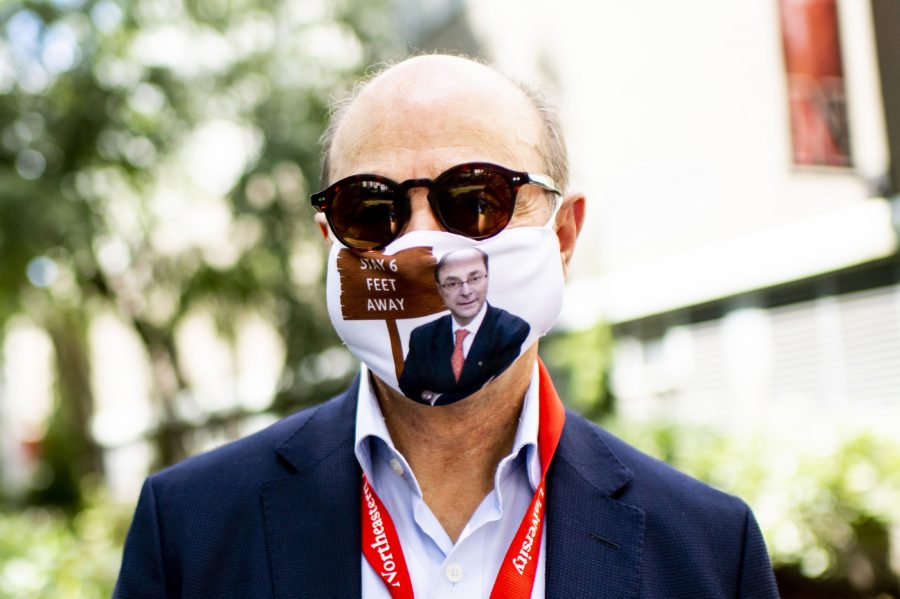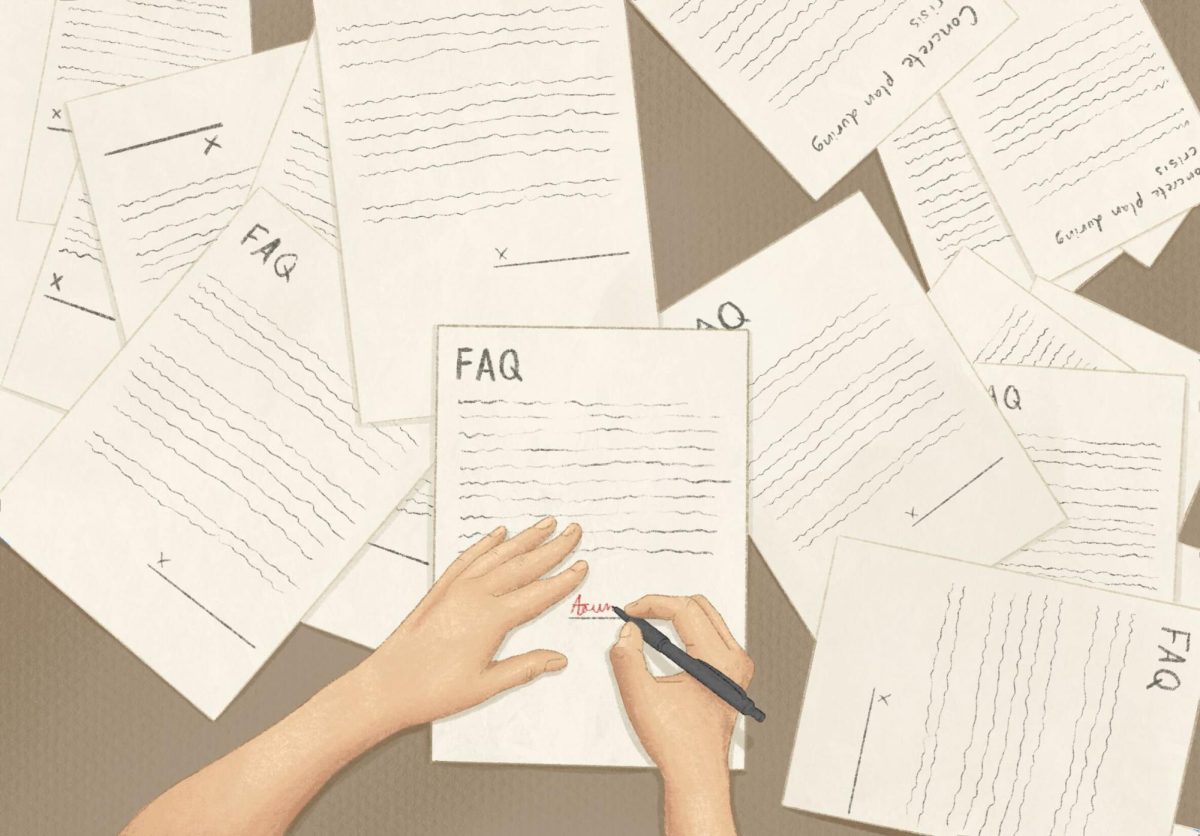Q&A: President Aoun discusses reopening Northeastern
Ruby Wallau, Northeastern University
President Aoun wears a mask created by Northeastern student Naomi Silver.
August 18, 2020
Northeastern President Joseph E. Aoun spoke with The News in an hour-long video call Tuesday about Northeastern’s plans to reopen for the fall 2020 semester and about his anti-racism and diversity goals for the university.
Below is the transcript of the conversation about reopening and COVID-19. Click here to read the Q&A about anti-racism and diversity. Click here to read a brief summary of the main points from the interview.
The following transcript has been edited for length and clarity.
The Huntington News: Why have you remained confident about hosting in-person classes, when so many schools have opted to go online?
President Aoun: Let’s start with the context of COVID-19, let’s start with what we are living. It is clear that to us, to all of us now as in society, that COVID-19 is endemic, which means that COVID-19 is not going to disappear in a semester or a year. Even if we find the vaccine, the projection is that the vaccine will not reach us citizens until two years from now, because first it has to go to first responders, health workers, et cetera, as it should. With this in mind, we clearly faced a situation where parents and students in the overwhelming majority wanted us to reopen. Essentially, they feel that the experience that they have at school is different from the experience that they have at home.
In addition, something important for us is the fact that throughout this situation, various studies and surveys indicated that low-income students suffer because essentially they live in nonoptimal situations. They don’t have the space, they often don’t have the connectivity. Here at Northeastern we were able to share with various members of our community not only the laptops, but also the opportunities for them to boost their WiFi connectivity etc. But even that was not optimal because many live in situations where they don’t have privacy, they don’t have the opportunity to study in a quiet environment.
So what did we do? We started by building our own testing labs and we are doing our own testing. Namely, every person is going to be tested and tested repeatedly, and that’s important. It’s not only people who are symptomatic. We also built our own labs because we are facing a situation where the commercial outfits are not able to give us the results before five, seven days and you know that you need to have the results within three days maximum. Here, we are aiming to have the results within 24 to 36 hours at the latest.
The second point is that also we built contact tracing so that if somebody is not well or tested positive, then their environment, maybe their friends, their cohorts are going to be tested too.
And the third aspect is that we are testing everybody, students who are on-campus and off-campus. This is relevant because it keeps the community safe, the community at large, not only the Northeastern community, because we have noticed that when universities are closed, the students like the environment of the university, and they team up together to live off-campus together without testing. So the risk for the community is large, whereas we are testing everybody, whether they are on-campus or off-campus.
The fourth aspect is that we reduce the density. We added 2,400 beds in hotels, apartment buildings, etc.. We reduced the density in the classroom, the density in dining services. You are going to see features that we haven’t fully advertised yet. For instance, you will be able to order your own food, à la Uber Eats, but it’s not Uber Eats, that will deliver. You will get your food delivered to your door. We added tents in order to add to the space we have and to allow for more interactivity in a less dense environment.
But more importantly, too, we added something called NUflex. NUflex allows the students to be involved in the classroom, not like Zoom, way better than Zoom or Microsoft Teams. It’s really more interactive. What we have done is build a situation that is flexible, that allows the students to really take advantage with what is offered and have a personalized experience.
So to summarize, the situation is endemic and is going to be with us for two to three years, and we believe that the best experience is the experience that is residential.
As a matter of fact, I studied in residential and nonresidential environments throughout my life and I see the difference. The students and their parents told us that they want to come back and how to do it was based on wellness, safety and everything I explained so far.
HN: A lot of universities that have already welcomed students back like UNC-Chapel Hill and Notre Dame have seen serious outbreaks on-campus already. Is the university paying attention to these cases? How are these case studies factoring into Northeastern’s planning? What is Northeastern doing differently to prevent these outbreaks?
President Aoun: We are a learning institution. And therefore we are looking at everything that is being done and how it is being done. Something that is important is that we are testing ourselves systematically. Other institutions chose to have sample testing, namely they sample some students and that’s not enough. We learned that from their experience. Others have decided to test only people with symptoms and that’s not enough. We are monitoring everything that is being done not only in higher education, and not only in the United States, we’re looking at what happened in Asia. We’re looking at what happened in Europe. You know, how they were able to tame COVID-19 and its impact.
The other aspect that is important, that we need to stress constantly, is that it’s going to be a community of responsibility. So for instance, you know that we have to wear masks. This is not negotiable. You know that we have to be tested. This is not negotiable. We have to do the wellness check. So, it’s a community responsibility. Whether students are on-campus or off-campus, the responsibility is the same.
HN: Do you believe the university is ready to respond to a COVID-19 outbreak on-campus?
President Aoun: As I stated at the beginning, the wellness and safety of our community is paramount. We have a full infrastructure to meet the issue if it arises. We have dorms ready for isolation. If, God forbid, any student has COVID-19, then they are going to be taken care of by Tufts Medical Center in a personalized way. We want the treatment to be personalized, to be timely and to be as tailored as it is. Hospitals may be overwhelmed. Whereas with this agreement, every student who [tests positive] will have personalized care.
We have a center called the Global Resilience Institute. It’s led by one of our faculty colleagues, Stephen Flynn. This institute works nationwide and also globally on helping communities and cities move forward when there is a crisis. Professor Flynn has been working with [the Federal Emergency Management Agency] for some time, and the regional administrator of FEMA is a great person who knows us. And he and professor Flynn worked on how to get all the universities to behave as a sector. So if there is any challenge, any issue, the hope is for universities to not go at it alone, but coordinate their activities, their responses. And then the hope is also for FEMA to help us because there would be enormous needs, financial and otherwise. So what we did is convene a meeting of 16 university presidents and we agreed to coordinate our activities and work with FEMA and 108 federal agencies.
The whole idea is that the higher education sector, especially in the metro Boston area, is very important to the community. It’s important to the community because we have merchants, we have businesses, we have people who are relying on us. So if we close, then the community is going to be impacted. That’s why merchants, small-business owners, individual business owners around us, have been asking us, ‘Please reopen because we need your students, your faculty and your staff to do business with us.’ So what we did with FEMA was really something exciting to all of us because it allowed us to bring the higher education sector together so we can work together, and we can work with FEMA to be ready for any opportunity or any challenge or any crisis.
HN: Will this personalized care be available for off-campus students who get the virus?
President Aoun: Yes. This will apply to any enrolled student living on campus or off campus in Boston.
HN: Do you think the university’s plan guarantees that no students, staff or faculty will die of COVID-19 as a result of reopening campus?
President Aoun: No one in the whole nation and no one in the whole world can guarantee anything.
Okay, why? Because we’re in it together. We are one community. And we are going to make sure that wellness and safety are paramount. But you know that this is the beginning and we all have a responsibility, as I said.
Young people first thought that this is not an issue that is impacting them. Now, we are seeing that this is not the case. I personally trust our students. That’s why we want our students to be part of whatever is being done, for instance, the campaign that you are seeing, “Protect the Pack.” There is a component that is led by the students. And that’s the beauty of being a community. Frankly, I can tell you, I have been interacting with many of our students, and it has been an experience that is highlighting not only their needs, but also their priorities. For instance, many people told me, ‘I have been involved in giving back to the community, in doing service learning or doing community service.’ Some people because of this situation are rethinking their engagement and increasing it.
HN: City councillors, state legislators and many others have said they’re concerned that bringing thousands of students back to the city could threaten to spread COVID-19 in the surrounding community and disproportionately impact seniors and people of color in neighborhoods where Northeastern students live and spend time, like Roxbury, Mission Hill, Jamaica Plain and others. What is your response to these leaders who are asking Northeastern to change its plans? What is Northeastern doing to protect our neighbors?
President Aoun: As I mentioned before, this is a collective responsibility. I also mentioned that, students nationwide, when the school is closed, rent places in town are not being tested. They live there and they’re not being tested, and therefore it increases the risk for the community. So what we have been doing here, as you know, is testing everybody.
More importantly to your question, we have been engaging with the elected officials. To explain that, let me give you another point of information that is very relevant. The state of Massachusetts is testing on a daily basis around 14,000 people per day. We are testing 5,000 people per day. [Other universities] are also testing their students. So if you put all this together, all these tests, we are exceeding what is being done at the state level. We are helping the state and the citizens of the state because we are increasing the number of people being tested.
Our community has engaged with the elected officials at all levels, including the city council. But ultimately, this is going to be an engagement with everybody. The community is looking at it and saying, ‘Are the students going to jeopardize my safety?’ Quite the opposite. We feel that our students are going to increase the safety because they are being tested.
But that’s not enough. There is a responsibility for every student in the community to keep their masks on, to reduce the density, to reduce gatherings and the parties. We all are in it together.
HN: In light of the perilous financial situation many students have found themselves in, why is tuition still increasing this year, including for students who will be participating only online?
President Aoun: The first aspect that is important is that we have increased financial aid dramatically. We are giving over $350 million in financial aid. That’s important. In a situation like this, in order to ensure the safety and the wellness of the community, we have increased and incurred and invested in many aspects that will benefit the community of students. For instance, testing.
Testing is going to be free throughout the year, as long as we have the same situation with COVID-19. In order to do that, you need to invest in infrastructure in a new lab, you have to invest in people that are there. Also we have invested more than $50 million to open safely. So for instance, the additional NUflex technology, it’s a new whole new investment that allows our students to have the maximum flexibility.
HN: Two factors that are very important to a Northeastern education are experiential learning through co-op and global experience. How has the pandemic impacted these pillars of a Northeastern education and how is the university planning to deliver on these goals this year?
President Aoun: It’s interesting, because with what we are seeing here, the past is going to help us look at it and understand it. In 2008, we had a very bad recession and an economic crisis. We were worried about co-op and experiential education, if it is going to impact our students. In fact, we saw something that [at first] was counterintuitive, but in fact, it made sense. We saw that the numbers of co-ops during this recession increased. It takes around six to eight months for companies to adjust, but they increase the number of co-ops.
We didn’t understand why, so we started talking to a network of companies and NGOs and employers. The answer was, ‘We need a pipeline full of talent. Your students are the future. Your students are very enterprising, very creative. And we need this.’ Now we are seeing that the first period is for institutions to adapt to the shock and then even when they were having those challenges, they decided to continue to invest in co-ops. We are seeing signs of that happening now. So what’s happening now? Most of our co-ops have now moved online. Why? Because the world moved online. Some of the co-ops disappeared. Some institutions came and asked us for more, like the telemedicine industry.
If you look at it from the point of view of the students, you are living the perfect existential and experiential education. Because the world is changing and the experience of this world is changing. That’s why you came here, to get you to understand the reality and you’re doing it. Some are doing it physically, in terms of co-ops, and some are doing it in a virtual way. But it’s happening. Now, is it going to be rosy? No, because we know that companies are challenged, institutions are challenged. But we know that even when they are challenged, many institutions still want a pipeline for creative talent. This is what we are living. This is what you are living, and we’re all adapting.
HN: If students or faculty have concerns about the way the university is handling reopening or diversity and inclusion,, what’s the best way for them to bring them to your attention?
President Aoun: We have had many town halls. People can express their questions, their anxiety at any levels, not only town halls. The faculty can talk to the chair of the department. The staff can talk to the person they report to. The students have multiple ways of interacting with the vice chancellors, with the chancellor. [Chancellor] Ken Henderson is ready to work with and for students. So you have multiple venues, just let us know.







